This piece was originally published in the September 23, 2020 edition of CAP Action’s weekly newsletter, What’s Trending? Subscribe to What’s Trending? here.
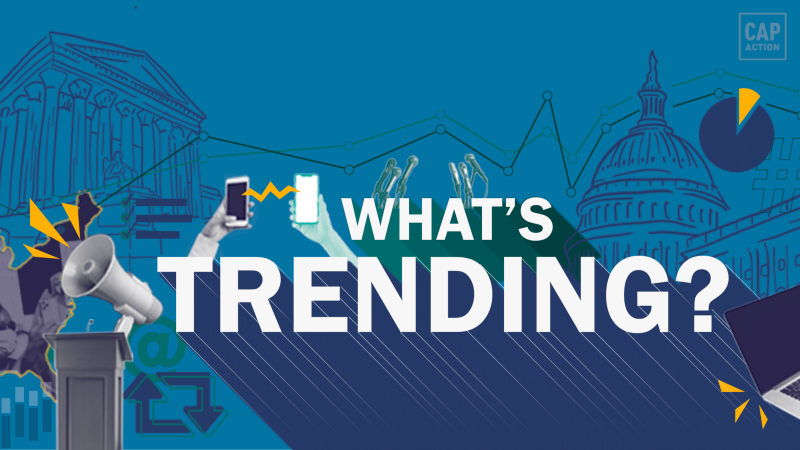
Hey, y’all.
Any time I’m overwhelmed, I do what I imagine a lot of you do, too — I call my mom. And since I was a little girl, her advice has been the same: Make a list and take it one thing at a time.
So after spending my Friday night mourning the loss of Justice Ruth Bader Ginsburg, I made a list: preventing the erasure of those lives lost to coronavirus, holding Donald Trump accountable for his mismanagement of our economy, ensuring we postpone a vote on RBG’s replacement until post-inauguration.
Even as I write this, news is breaking. When it lands in your inboxes tomorrow morning, the balance could have shifted dramatically. So we’re going to take this newsletter one thing at a time. This week we’re diving into the conversation about the Supreme Court immediately following the announcement of Justice Ginsburg’s passing. Read on to learn more.
But first, did you miss last week’s edition of What’s Trending? Don’t worry — you can read it here.
WHAT’S TRENDING THIS WEEK
- The country is mourning the loss of Justice Ruth Bader Ginsburg, who passed away on Friday after battling a recurrence of pancreatic cancer. Her death leaves a hole in our hearts and our movement, but also in the highest court. The conversation quickly shifted to the fight over a Supreme Court vacancy, with Mitch McConnell hypocritically promising a vote on a nominee before the election. The right’s #FillTheSeat trend garnered over 93,000 posts, and progressives’ #OurCourt earned 2,032.
- According to a report by the New York Times, emails from a former top Trump health official show how the administration refused to accept the CDC science on the coronavirus pandemic and worked to silence the agency. This follows a distressing pattern of this administration manipulating CDC coronavirus data: on vaccines, testing, and virality. Meanwhile, more than 200,000 have died from the coronavirus.
WHAT WE’RE HEARING ON SOCIAL
Here are this week’s top five Facebook posts on the Left and Right:
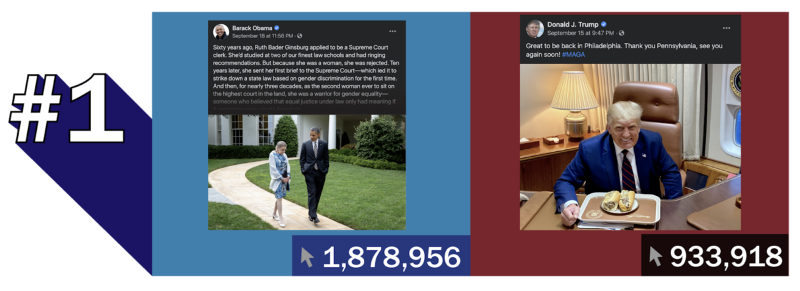
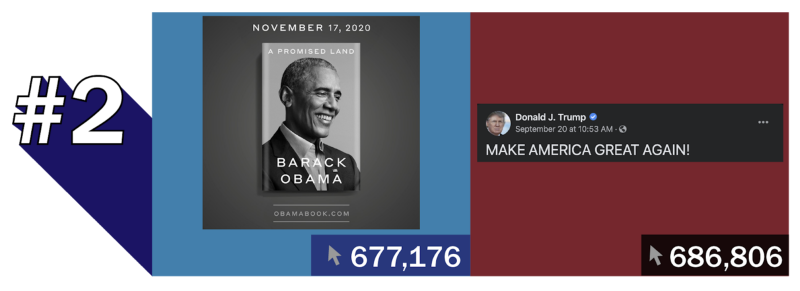
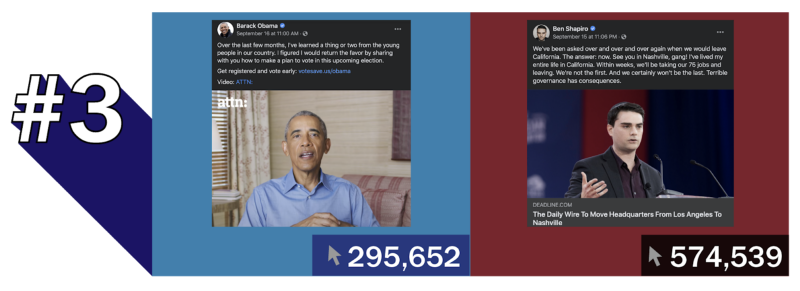
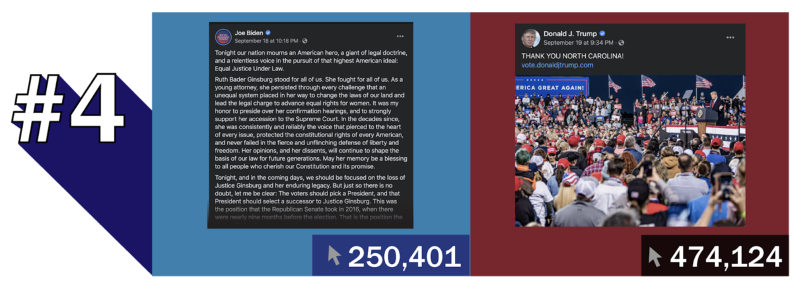
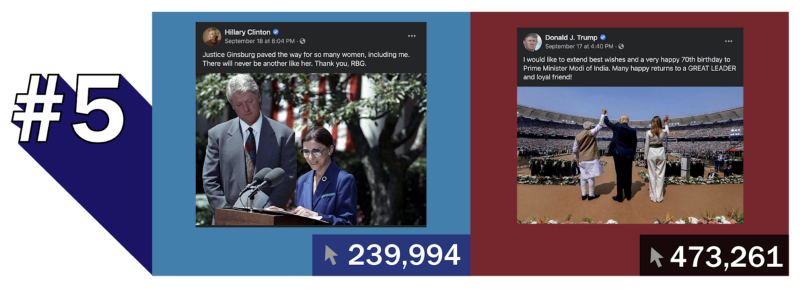 5 best-performing Facebook posts by total interactions among 200 of the largest conservative and progressive pages for the week of September 15–September 21, according to CrowdTangle
5 best-performing Facebook posts by total interactions among 200 of the largest conservative and progressive pages for the week of September 15–September 21, according to CrowdTangle
The fate of the Supreme Court: Following the announcement of Justice Ginsburg’s passing, social media was flooded with posts honoring her life and the impact she had on our country, especially improving the lives of women. Those remain the most popular posts on this topic by total interactions.
Just over an hour after the announcement, however, Mitch McConnell issued a statement, promising to hold a vote for Donald Trump’s choice for her replacement, never mind the fact that he has delayed passing a coronavirus relief bill for more than four months, and despite his own refusal to do so for Merrick Garland in 2016. This immediately politicized her passing and led to an avalanche of posts about what confirming a conservative justice would mean for the country.
Overall, the volume of posts about Justice Ginsburg and the battle for the Supreme Court on the right is low. Those who have posted have mostly expressed support for Trump nominating a candidate and pressured more moderate members of Congress to vote for that person. Some did publish posts honoring her legacy.
The story on the Left is more nuanced — overwhelmingly the most popular posts, excluding those honoring Justice Ginsburg, are about Mitch McConnell’s shameless hypocrisy. This makes sense — we know the progressive base is fired up by that message. We also know, however, that the looming potential loss of the Affordable Care Act, protections for people with pre-existing conditions, and the threat to Roe v. Wade are more persuasive for those in the mushy middle who are disgusted by the politicization of the Supreme Court fight.
Posts about “hypocrisy” and associated keywords outnumbered posts about “health care” and associated keywords 383 to 148, according to data from CrowdTangle. And the number of interactions on those posts is even more stark: The top 10 posts about health care garnered 2,363,404. The top ten posts about hypocrisy? 3,013,911. And that’s just the top 10.
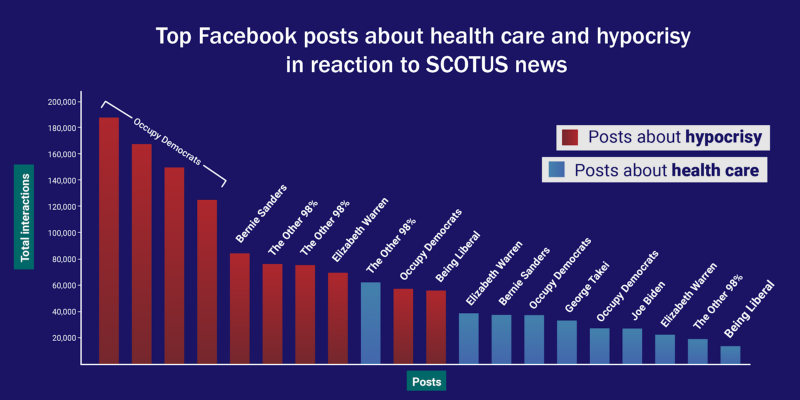 Top Facebook posts from progressive pages about hypocrisy and health care, according to CrowdTangle
Top Facebook posts from progressive pages about hypocrisy and health care, according to CrowdTangle
And what were those top posts? See the below. But first, a note: The size and engagement levels of the Obamas’ Facebook pages are enormous. Their posts almost always tower over others, by a huge margin, in political moments. For that reason, I have excluded them from the above data — they just skew the chart too much.
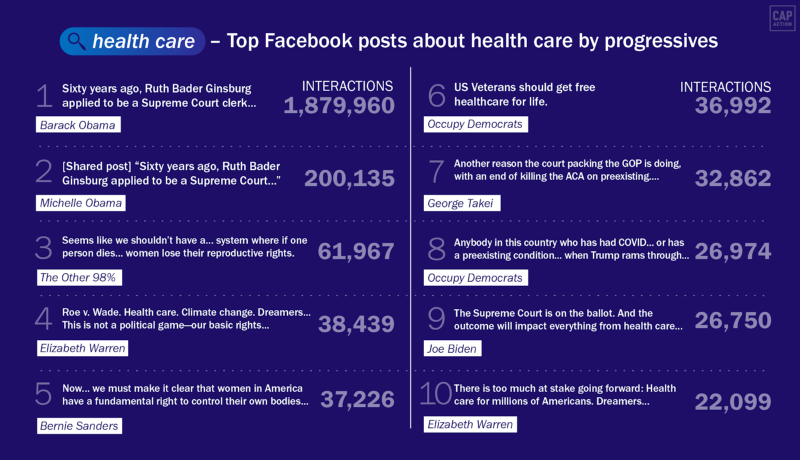
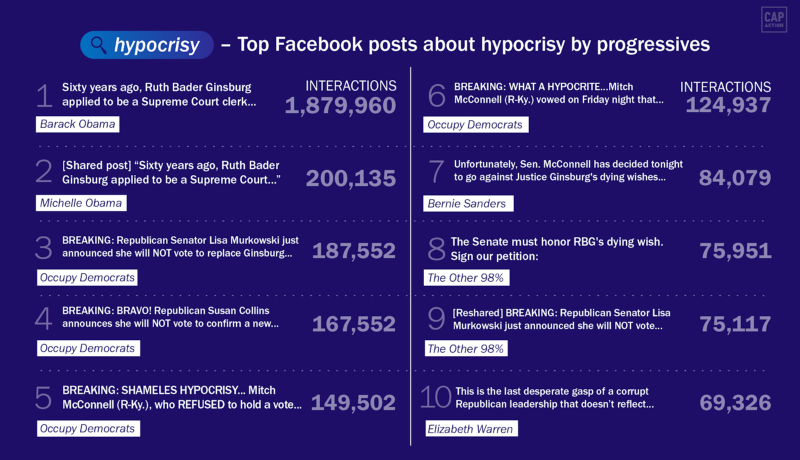
So if you are engaging about this battle on Facebook, here’s my advice: Know your audience. If you are a progressive organization hoping to mobilize people who already agree with you, by all means, focus on the hypocrisy message. But if you are a candidate, a campaign, or an organization hoping to persuade voters, we cannot talk about the threats to our health care — including reproductive care — enough.
SAY IT WITH ME
- Mark Zuckerberg admitted to employees that Facebook is likely to fare better under Republicans, according to a recent report from Bloomberg.
- The company’s well-documented acquiescence to conservatives becomes even more dangerous the closer we draw to Election Day, as Trump and far-right news sites’ spread of disinformation goes largely unchecked.
The bottom line: Facebook has admitted favoring Republicans is better for business, so it’s unsurprising that it’s refused to take the necessary steps to stop the spread of disinformation on the platform.
ON MY RADAR
- Saturday, September 26, Supermajority (@Supermajority) is hosting Supercharge 2020: a streaming celebration and national day of action packed with the inspiring voices of powerful women politicians, grassroots fighters, and artists. RSVP here!
- Tuesday, September 29, is the first 2020 presidential debate. It will be from 9–10:30 p.m. ET and will be aired on all major networks.
When: Tuesday, Sept. 29 from 9–10:30 p.m. Eastern time
Where: Case Western Reserve University in Cleveland
Where to watch: The Washington Post will have an uninterrupted live stream of the debate.
Moderator: Chris Wallace, anchor of “Fox News Sunday”
ASK ALEX
A reader asks, “Are Republicans just better at Facebook? Or are liberals/progressives just leaving Facebook as a platform?”
Great question! You could write a book on this, but let’s take a quick look:
While the demographics of who uses Facebook are shifting, it remains, by far, the most popular social media platform in the United States, other than YouTube. And while it’s popular across age groups, the percentage of older Americans who use the platform has more than doubled since 2012, a leap from 20% to 46%. We know older voters tend to vote more conservatively, so this could account for some of the shift.
More mainstream conservative pages don’t significantly outperform progressives — the discrepancy is mostly due to the performance of far-right mega-pages like Fox News, Ben Shapiro, Dan Bongino, and the like, that publish hyper-partisan content. Progressives have fewer of these to compete — think The Other 98%, NowThis, and Occupy Democrats.
Another reason those mega-pages are performing so well? Early on, Republicans created networks of conservative mega-pages that share one another’s content, boosting it in the Facebook algorithm.
Thanks so much for your questions and your time!
Let’s make RBG proud,
Alex
P.S. Please do forward along to your friends who are interested or encourage them to sign up here.
This newsletter is written by me, Alex Witt (@alexandriajwitt), a progressive political strategist and Dolly Parton enthusiast (she/her). I’ve managed social media programs for presidential candidates, political committees, progressive advocacy organizations, and more.